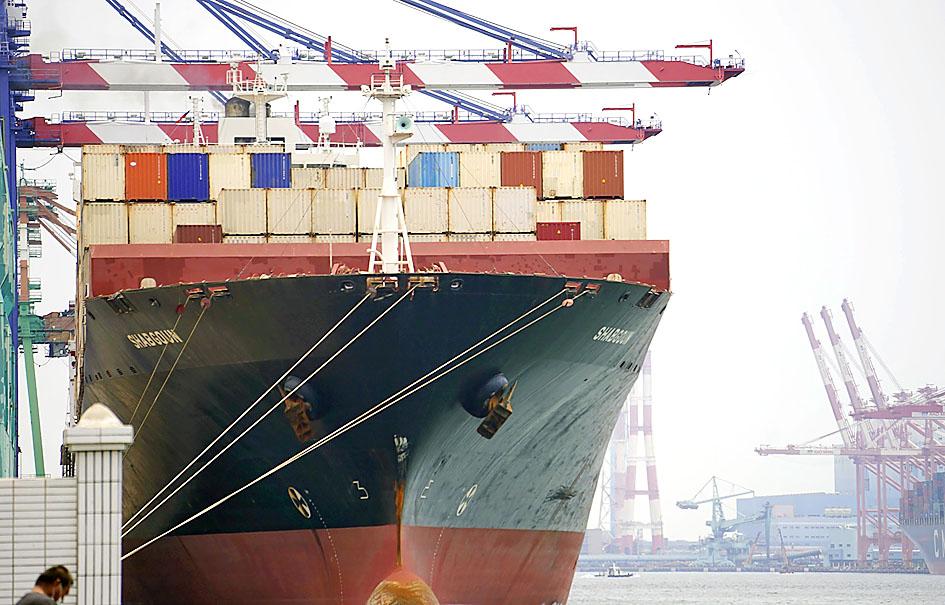Taiwan’s exports last month grew 29.2 percent year-on-year to a record US$39.65 billion, as demand for electronics used in digital transformation and new technology applications increased, the Ministry of Finance said yesterday.
Non-tech sectors also benefited from inventory replenishment demand, fueled by a continuing global recovery that allowed their growth to be faster than technology products, Department of Statistics Director-General Beatrice Tsai (蔡美娜) said.
The results outperformed her estimated gain of 23 to 27 percent despite fewer working days due to the Mid-Autumn Festival.

Photo: CNA
“All major product categories saw solid gains, although optical devices, mainly camera lenses used in smartphones and flat panels for laptops and TVs, only increased 4.8 percent, the slowest in 14 months,” Tsai said.
Demand from remote working and schooling lessened as vaccination rates improved around the world, she said, adding that China’s tightened controls of non-school educational facilities helped dampen buying interest.
That accounted for relatively lackluster showings for shipments of optical and memory products, as some suppliers opted to arrange annual maintenance of spare capacity.
Overall, exports of electronics rose 26.8 percent to US$16.58 billion, thanks to record chip shipments that swelled 27.6 percent year-on-year to US$15.11 billion, Tsai said.
Taiwan Semiconductor Manufacturing Co (台積電), the sole chip supplier for Apple Inc’s iPhone series, yesterday posted NT$152.69 billion in revenue for last month, the first rise above the NT$150 billion mark and representing a 19.7 percent upswing to a new high.
Shipments of information and communications products jumped 22.8 percent to US$5.4 billion, the ministry’s report showed.
Exports of base metal, plastic, chemical and mineral products posted steeper gains of between 32.5 and 139.8 percent from a year earlier as the US and Europe sought a return to normalcy despite ongoing COVID-19 infections.
Imports rose 40.4 percent to US$33.21 billion, as local semiconductor firms aggressively purchased capital equipment to meet business needs and upgrade technologies, the report said.
That gave Taiwan a trade surplus of US$6.45 billion, a decline of 8.6 percent from a year earlier, it said.
For the third quarter, exports advanced 30.1 percent, slightly missing the government’s August projection of 30.42 percent. Imports increased 42.5 percent, beating the forecast of 38.7 percent, the report said.
Exports are expected to remain vibrant this month with an increase of 21 to 25 percent and are likely to exceed US$40 billion, despite a high base last year, Tsai said.
For the first nine months, exports grew 30.7 percent to US$324.07 billion, while imports gained 33.3 percent to US$276.39 billion, the ministry said.

RECYCLE: Taiwan would aid manufacturers in refining rare earths from discarded appliances, which would fit the nation’s circular economy goals, minister Kung said Taiwan would work with the US and Japan on a proposed cooperation initiative in response to Beijing’s newly announced rare earth export curbs, Minister of Economic Affairs Kung Ming-hsin (龔明鑫) said yesterday. China last week announced new restrictions requiring companies to obtain export licenses if their products contain more than 0.1 percent of Chinese-origin rare earths by value. US Secretary of the Treasury Scott Bessent on Wednesday responded by saying that Beijing was “unreliable” in its rare earths exports, adding that the US would “neither be commanded, nor controlled” by China, several media outlets reported. Japanese Minister of Finance Katsunobu Kato yesterday also

Jensen Huang (黃仁勳), founder and CEO of US-based artificial intelligence chip designer Nvidia Corp and Taiwan Semiconductor Manufacturing Co (TSMC, 台積電) on Friday celebrated the first Nvidia Blackwell wafer produced on US soil. Huang visited TSMC’s advanced wafer fab in the US state of Arizona and joined the Taiwanese chipmaker’s executives to witness the efforts to “build the infrastructure that powers the world’s AI factories, right here in America,” Nvidia said in a statement. At the event, Huang joined Y.L. Wang (王英郎), vice president of operations at TSMC, in signing their names on the Blackwell wafer to

‘DRAMATIC AND POSITIVE’: AI growth would be better than it previously forecast and would stay robust even if the Chinese market became inaccessible for customers, it said Taiwan Semiconductor Manufacturing Co (TSMC, 台積電) yesterday raised its full-year revenue growth outlook after posting record profit for last quarter, despite growing market concern about an artificial intelligence (AI) bubble. The company said it expects revenue to expand about 35 percent year-on-year, driven mainly by faster-than-expected demand for leading-edge chips for AI applications. The world’s biggest contract chipmaker in July projected that revenue this year would expand about 30 percent in US dollar terms. The company also slightly hiked its capital expenditure for this year to US$40 billion to US$42 billion, compared with US$38 billion to US$42 billion it set previously. “AI demand actually

RARE EARTHS: The call between the US Treasury Secretary and his Chinese counterpart came as Washington sought to rally G7 partners in response to China’s export controls China and the US on Saturday agreed to conduct another round of trade negotiations in the coming week, as the world’s two biggest economies seek to avoid another damaging tit-for-tat tariff battle. Beijing last week announced sweeping controls on the critical rare earths industry, prompting US President Donald Trump to threaten 100 percent tariffs on imports from China in retaliation. Trump had also threatened to cancel his expected meeting with Chinese President Xi Jinping (習近平) in South Korea later this month on the sidelines of the APEC summit. In the latest indication of efforts to resolve their dispute, Chinese state media reported that